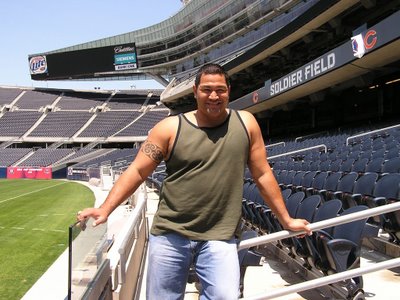 CHICAGO, ILLINOIS - As a 340-pound (154-kg) nose tackle in the National Football League, Esera Tuaolo was a pretty tough guy. But as a closeted gay athlete he recalls living in constant fear.
CHICAGO, ILLINOIS - As a 340-pound (154-kg) nose tackle in the National Football League, Esera Tuaolo was a pretty tough guy. But as a closeted gay athlete he recalls living in constant fear."I felt like if I had come out while still in the NFL I would have been in physical danger," Tuaolo told Reuters this week. "They would have taken me out -- gone after my knees, or tried to paralyze me."
Hawaiian-born Tuaolo, who played for the Atlanta Falcons in the 1999 Super Bowl game, was in Chicago to participate in the weeklong Gay Games VII sports festival, and appeared on a panel called "Brokeback Locker Room," about the challenges facing gay and lesbian athletes.
Panelists agreed that although homosexuals now enjoy increased acceptance in public life, the sports arena has been a tough nut to crack.
"Sports is the last frontier in terms of homophobia," said Helen Carroll, sports project coordinator with the National Center for Lesbian Rights in San Francisco.
For that reason many athletes, including women's basketball standout Sheryl Swoopes and golfer Rosie Jones, have waited until the twilight of their careers before coming out.
In baseball, "there's a lot of pressure to fit in with what everyone else is doing -- you need to have a really hot-looking wife and start having kids right away," said Billy Bean, who played for three major-league teams from 1987 to 1995.
Bean "came out" as a homosexual in 1999. In the intervening years little has changed for gay athletes in the sport, he said.
'FRONT OFFICE WORRIES'
"There is one kid in the minor leagues who e-mails me two or three times a day. But big leaguers won't risk anything -- even an e-mail could become public information," he said.
Even as public acceptance of gays develops, "Owners and managers are afraid of two or three players poisoning the team atmosphere ... it's that mixture that the front office worries about," Bean said.
Leigh-Ann Naidoo, a South African beach volleyballer, said she could hardly believe that at the 2004 Olympics in Athens she was one of just a dozen or so "out" athletes.
"My coming out was so I could share my Olympic experience fully with my partner," she said. "But it doesn't threaten my life to say that I'm gay, whereas for others it may."
Tuaolo said he is working with about 30 high school and college athletes on "coming out" issues. He has also spoken to NFL employees and, last season, to the NFL's rookie symposium about homophobia and on being a gay man in sports.
Carroll said more and more standout high-school athletes are out, and that one of her missions has been to counsel coaches about how to deal with such situations.
"I tell coaches: 'You have a gay or lesbian athlete and you'll have a better team if you get the team to gel together,'" she told Reuters.
Still, Carroll said, talking only goes so far, adding, "My new mantra is educate -- and litigate. It seems to take us a bit further toward our goals."
from Reuters
No comments:
Post a Comment